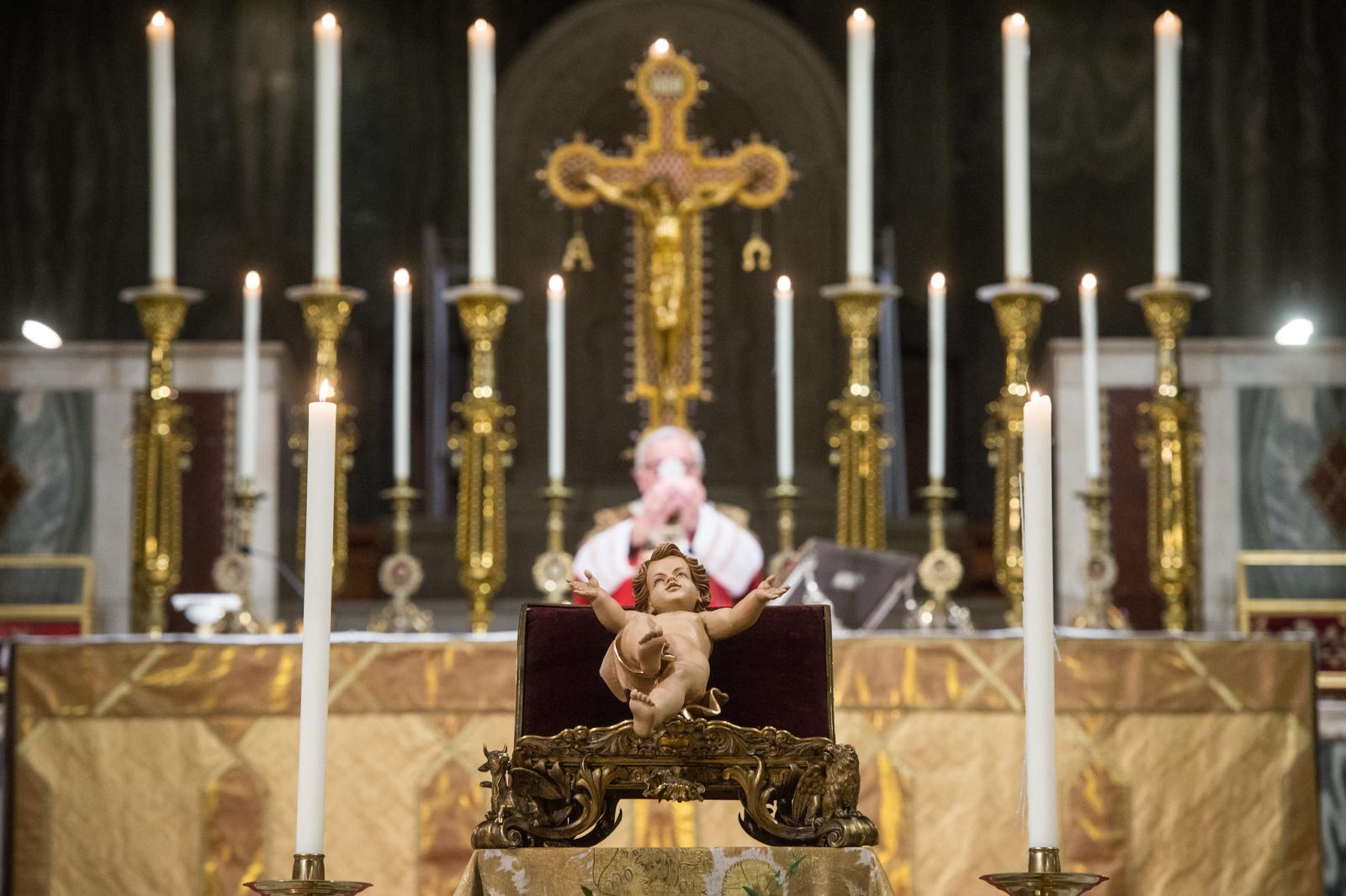Given at Midnight Mass, Christmas 2021, in Westminster Cathedral
There is a poem by Frances Chesterton which opens with the words: ‘Here is the little door’. Some of you may know it, more probably as set to music as a carol. It speaks of the visit of the Wise Men to the child Jesus with ‘such tiny hands and oh such tiny feet.’ The scene it portrays is intimate and humble.
Today you will have entered the Cathedral not through a little door, but the Great West Door. In doing so you have come face to face with the beautiful Crib, not hidden away in obscurity, but in full view, inviting all who enter, and those beyond the threshold too, to be drawn into the Christmas story, this Christmas Feast.
This interplay between great and small, heavenly and earthly, human and divine is at the heart of this Feast, so characteristic of the coming of Christ. Indeed, he is the ‘great little one’. There is no contradiction in this. The Christ-child is true God and true Man. He is the Eternal Word made flesh. This is the central reality of our faith. Kings and shepherds adore him. He gives to us the light of life, the pattern and grace for living the truth. This is given to all who will receive his invitation, from the celebrated to the most hidden. No-one is excluded from the joyous consequences of the Birth that we recall tonight.
He has come to give a new shape to our lives, a shape which brings wholeness and salvation. His coming has consequences for the choices we make, as individuals and as humanity.
Yes, we are living in a time of great vulnerability, for ourselves and for our world. It is tempting to counter that vulnerability by putting up heavy defences, making sure that I, and those close me, or citizens of wealthy countries, come first, whatever the cost. The vulnerability chosen by the Christ-child challenges such thinking. Pope Francis addressed this challenge recently, when he met a group of migrants in Nicosia. Echoing the words of St Paul, he said that God was encouraging ‘a dream of humanity freed from the walls of division and hostility, where there are no longer strangers, but only fellow-citizens’.
Something of this dream became a reality for me a few years ago, when I visited a family of refugees in Erbil in Iraq. They had fled their home in a matter of hours, bringing only what they could carry. Now they lived in a converted shipping container. From them, I received the most generous of welcomes, truly being treated not as a stranger, but as a fellow-citizen, someone seeking to walk, like them, the pathways of the Christian faith. Vulnerability had not overwhelmed them.
Vulnerability is close to us this Christmas, even as we sit in this great Cathedral, with its reassuring solidity. The example of that refugee family can inspire us for we too face the challenge of welcoming refugees. Can we learn from our own vulnerability to feel more deeply the terrible vulnerability of others and open our hearts to them? Can we, like that Iraqi family, embrace and live our vulnerability together with the ennobling qualities of generosity and of faith? That is the pathway of life.
This Christmas, I encourage you to spend some time at the Crib. It may be the one in this Cathedral, with its large scale. It may be a much more intimate one, perhaps one you have set up in your home. Time spent with the Christ-child is never wasted. Let us ponder on this moment when God’s plan for salvation became tangible in a tiny baby. Think of Mary and Joseph. In them the mixture of joy and fearful vulnerability must have been intense. Whether we identify with them, or more easily, perhaps with a shepherd, a king or even a donkey, we come in humble adoration of him who is both a helpless baby and our Lord and Master.
And as you spend time at the Crib, listen out for the echo in your hearts of the song of the angels, ‘Glory to God in the highest’. We have just heard it sung, beautifully, by the choir at this Mass. It was, of course, first sung at night, not in a great Cathedral, but to the shepherds in their rocky fields. It is a reminder to us that the birth of Christ is always a cause for joy, a joy that no anxieties, or sin, or uncertainty can shut out. It offers us a renewed appreciation that, at Christmas, the brightness of heaven touches our world, and everyone who is a part of it, without exception. It is a sign to us that God’s gift of salvation is assured, brought to us in the person of a tiny baby before whom, on this Christmas night, we readily bend our knee for he alone do we adore.
A very happy Christmas to you all.
✠Cardinal Vincent Nichols
Archbishop of Westminster
